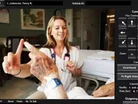Telemedicine and mobile technology revolutionize U.S. and China

Written by Alyssa Clark
In the attempt to reduce healthcare costs, assist aging populations, access disparities and chronic illnesses which threaten daily life, the traditional healthcare system no longer seems to hold-up when put in the modernized ways in which the world operates today.
As healthcare initiatives present challenges to struggling nations around the country, two of the world’s most successful countries have continued to push past the established boundaries and broken into new levels of success. For the United States and China, the ever-changing capabilities of the healthcare world not only present an interesting competition in terms of who will best-serve its people, but provide interesting industry benchmarks when analyzing what investments, decisions and initiatives work for the respective countries, and which do not.
Mobile technology and telemedicine seem to be the answers to today’s modern medical problems, as scholars from the U.S. and China pave the way to ending the present problems in today’s healthcare markets. In a recent report by Yu Xiaohui, Han Han, Du Jiadong, Wei Liurong, Li Cheng, Zhang Xueli, Li Haihua, Huang Ying, Sun Ke, Li Na, Darrell M. West and Joshua Bleiberg, proposed solutions to the plaguing problems facing healthcare professionals today are attempted to be solved through the marvel that is mHealth.
Pulled directly from the report, the authors suggest four ideas that policymakers can extol and undertake to speed the development and adoption of mHealth:
1. Mobile devices offer the potential to improve affordability of health care by lowering disparities based on geography and income.
2. Public officials should reimburse health providers who offer consultations, diagnoses, and treatment through remote monitoring devices and other types of mobile technologies;
3. Mobile phones aid the patient experience by providing a means to deliver medical reminders and diagnostic information to patients and physicians.
4. mHealth helps policymakers by encouraging better health data collection and analysis.
